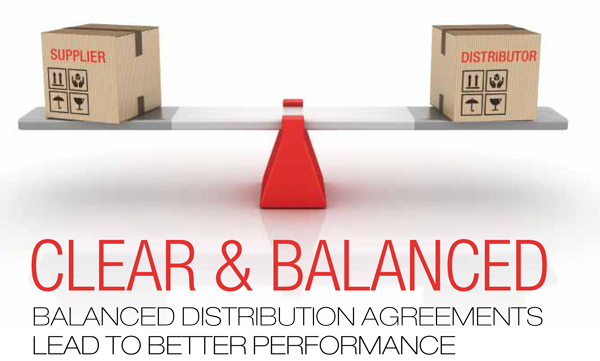Clear and balanced

by Glen Balzer
Shortcomings of a distribution agreement are frequently not apparent until a distribution relationship deteriorates. If the unwinding of a relationship leads to court, the costs to both the manufacturer and distributor quickly escalate, potentially reversing months or years of accumulated profit. Exercise care when drafting, negotiating and approving the agreement to ensure the presence of a minimum of two features: First, draft the agreement in a balanced style, providing unfair advantage to neither party. Second, compare the agreement to several other agreements used within the same industry in order to ensure no omission of standard and important features.
Distribution agreements must promote balance of power between the distributor and supplier. Clever wording that stacks more power toward one partner in relation to the other ultimately erodes trust. Performance excels where trust is nourished and allowed to thrive. When a party questions the trust of their partner, neither party applies optimum energy toward achieving goals of the partnership. An unbalanced agreement draws energy away from sales and growth performance, and toward issues of compliance with its terms and conditions.
An objective in common for both the distributor and supplier is leverage. The distributor, with the addition of a new supplier, has a greater product line to sell to customers, affording the distributor an opportunity to increase its importance to its customers. The distributor leverages a broader product line and increased sales without coinciding increases in the cost of its sales operation. The supplier, with the addition of a new distributor, enjoys more people selling its products. An additional distributor makes it easier for some customers to do business with the supplier. The supplier leverages a larger sales force and greater sales with no corresponding increase in the cost of its selling expense. Both distributor and supplier enjoy greater sales without incurring greater cost.
Organic Relationships
Relationships between distributors and manufacturers are organic. The relationships grow and develop at a time when they are in a period of great change. The relationships ultimately mature as growth slows. Once growth ceases and sales begin to decline, relationships begin to decay. After a long period of decay, relationships ultimately perish. People involved with managing relationships between suppliers and distributors recognize this organic analogy. Sales executives and managers who are new to relationships involving distributors and suppliers need to understand the life cycle of relationships. Knowing where a manufacturer and distributor are in their organic cycle is critical if executives from either side attempt to repair problems in that partnership. Solutions that may have worked well during the infancy of the relationship may not be effective once it reaches maturity.
Performance Supports Sales Growth
Words in a distributor agreement rarely extend the life of a relationship between a distributor and a manufacturer. However, properly constructed words and clauses in an agreement can make life easier for all involved during the lifetime of a distribution relationship. Equally important, skillfully constructed clauses can avoid agonizing battles when it is time to recognize that the relationship has died. When it’s time to terminate the relationship for any reason, parting company without a legal skirmish allows the distributor and the supplier to continue to focus time and energy on business, customers and profits; not on courtroom or arbitration battles.
What Does Balance Accomplish?
The best agreements integrate balance into the agreement. When a distributor and supplier feel neither subservient nor superior to their partner, both parties apply energy to mutual objectives: expanding sales, improving market share, driving manufacturing margin for the manufacturer, pushing gross margin for the distributor, and growing the number of customers. When the distributor and supplier believe that the relationship and agreement are well balanced, the mutual objectives shared at the creation of the agreement have a chance of success. Balance does not guarantee succeeding, but lack of balance almost certainly guarantees failure.
Examples of Balance
First, if a distributor can terminate the agreement for convenience, the manufacturer must be able to terminate the agreement for convenience, also. Second, if the supplier indemnifies and holds harmless the distributor if the supplier becomes embroiled in litigation, the distributor should likewise indemnify the supplier when the distributor becomes a defendant in a legal proceeding. Third, if the supplier can terminate the agreement for a number of specific causes, the distributor should also have a list of reasons which it might use to terminate the agreement.
Industry Comparisons
When a relationship unwinds and the termination process begins, problems in the agreement that were hidden or merely unobserved begin to erupt like volcanoes. During the operating life of a distribution agreement, partners frequently ignore omissions. Why? Sales are growing. Profits are growing even faster. When the relationship begins to unwind, some omissions in the agreement become obvious. An easy way to ensure that the agreement contains all important clauses is to compare the proposed agreement with several agreements found within the same industry. Trade associations and noncompeting suppliers and distributors often supply agreements upon request. Take time to review a representative sample of agreements before approving and signing that next distribution agreement.
Evenhanded wording in a distribution agreement will probably not extend the life of a relationship between a distributor and supplier. However, one-sided language often hastens the end of a relationship. Before approving and signing that next distribution agreement, compare it to agreements of competing distributors and suppliers within your industry. Check it for balance now knowing that you may avoid problems with the relationship in the future.
 Glen Balzer advises parties involved with contracts between suppliers, reps, global customers and distributors. Visit www.neweraconsulting.com.
Glen Balzer advises parties involved with contracts between suppliers, reps, global customers and distributors. Visit www.neweraconsulting.com.
This article originally appeared in the Nov./Dec. 2019 issue of Industrial Supply magazine. Copyright 2019, Direct Business Media.













